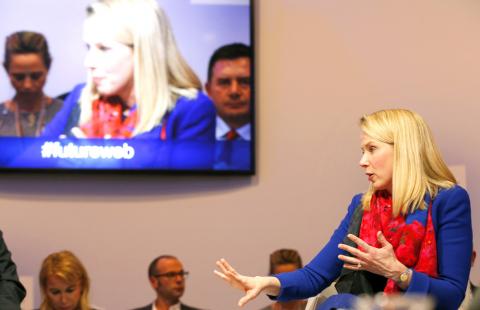Marissa Mayer, chief executive of Yahoo Inc, on Tuesday said that the Internet company would spin off its 15.4 percent stake in Alibaba Group Holding Ltd (阿里巴巴), China’s leading e-commerce company, into a separate company.
The decision, which Wall Street has been waiting for since Mayer joined the company in 2012, cheered shareholders because they will directly reap all the remaining profit from Yahoo’s prescient investment, which cost almost nothing a decade ago, but is now worth about US$39.5 billion.
In the process, Yahoo will avoid any taxes on the transaction, but will be stripped of its single most valuable asset. The Alibaba stake alone now makes up nearly 85 percent of Yahoo’s market value.

Photo: Bloomberg
Resolving the Alibaba question now turns the spotlight on Mayer’s plans to turn around Yahoo’s core Internet advertising business, which has dealt with years of declining revenue as advertisers and Internet users switched their money and attention to flashier, more innovative services from competitors like Google, Facebook and Twitter.
Mayer delivered a report card on her turnaround plan on Tuesday, noting that overall revenue and profit fell in the fourth quarter. However, the company’s mobile businesses, as well as other newer initiatives, like so-called native ads, showed rapid growth.
Still, the immediate reaction to the Alibaba announcement was positive, with investors driving Yahoo’s stock up by about 7 percent in after-hours trading after disclosure of the plan.
“It’s kind of hard not to view it as an unadulterated positive,” said Mark Mahaney, who follows the Internet industry for RBC Capital Markets. “This was the single biggest issue raised by activists.”
The Alibaba news overshadowed Yahoo’s report on its fourth quarter results, which gave little indication that Mayer’s turnaround plan was taking hold.
Yahoo reported revenue of US$1.25 billion and adjusted profit of US$0.30 per share in the quarter, slightly exceeding Wall Street’s expectations. Analysts had on average expected the company to report revenue of US$1.18 billion and adjusted earnings of US$0.29 per share, according to data collected by S&P Capital IQ.
The company’s net income was US$166 million, or US$0.17 per share, in the fourth quarter, compared with US$348 million, or US$0.33 per share, in the same quarter a year ago.
Yahoo sold a hefty chunk of its stake in Alibaba in September last year when the Chinese company sold shares in an initial public offering. Yahoo had a US$10.3 billion gain from the sale, but nearly 40 percent of that was eaten up by taxes.
Yahoo executives promised shareholders that they would find a way to dispose of the rest of the Alibaba stake in a way that incurred a much lower impact from taxes. Their solution — a spinoff of the Alibaba stake and a Yahoo operating business — avoids US$16 billion in corporate taxes that Yahoo would have owed if it had simply sold the stake, executives said.
The spinoff is expected to be completed in the fourth quarter.
One investor, activist hedge fund Starboard Value, had threatened to wage a fight over the company’s board if it was unhappy with Mayer’s strategy.

To many, Tatu City on the outskirts of Nairobi looks like a success. The first city entirely built by a private company to be operational in east Africa, with about 25,000 people living and working there, it accounts for about two-thirds of all foreign investment in Kenya. Its low-tax status has attracted more than 100 businesses including Heineken, coffee brand Dormans, and the biggest call-center and cold-chain transport firms in the region. However, to some local politicians, Tatu City has looked more like a target for extortion. A parade of governors have demanded land worth millions of dollars in exchange

An Indonesian animated movie is smashing regional box office records and could be set for wider success as it prepares to open beyond the Southeast Asian archipelago’s silver screens. Jumbo — a film based on the adventures of main character, Don, a large orphaned Indonesian boy facing bullying at school — last month became the highest-grossing Southeast Asian animated film, raking in more than US$8 million. Released at the end of March to coincide with the Eid holidays after the Islamic fasting month of Ramadan, the movie has hit 8 million ticket sales, the third-highest in Indonesian cinema history, Film

Taiwan Semiconductor Manufacturing Co’s (TSMC, 台積電) revenue jumped 48 percent last month, underscoring how electronics firms scrambled to acquire essential components before global tariffs took effect. The main chipmaker for Apple Inc and Nvidia Corp reported monthly sales of NT$349.6 billion (US$11.6 billion). That compares with the average analysts’ estimate for a 38 percent rise in second-quarter revenue. US President Donald Trump’s trade war is prompting economists to retool GDP forecasts worldwide, casting doubt over the outlook for everything from iPhone demand to computing and datacenter construction. However, TSMC — a barometer for global tech spending given its central role in the

Alchip Technologies Ltd (世芯), an application-specific integrated circuit (ASIC) designer specializing in server chips, expects revenue to decline this year due to sagging demand for 5-nanometer artificial intelligence (AI) chips from a North America-based major customer, a company executive said yesterday. That would be the first contraction in revenue for Alchip as it has been enjoying strong revenue growth over the past few years, benefiting from cloud-service providers’ moves to reduce dependence on Nvidia Corp’s expensive AI chips by building their own AI accelerator by outsourcing chip design. The 5-nanometer chip was supposed to be a new growth engine as the lifecycle